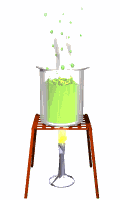Native American tribes in Washington are being invited
to participate in a new project to teach science and math, possibly by linking learning to daily activities in
Indian communities.
The project,
administered by the Mathematics, Engineering and Science Achievement program at the University of Washington, aims
to keep more Native American students in school.
The effort
will be paid for in part by a $1.6 million gift from the Bill and Melinda Gates Foundation. About $366,000 will
be used to bring MESA to K-12 tribal schools and to rural schools with high Indian enrollments.
Most of the
rest of the gift, nearly $1 million, will go toward expanding MESA into elementary schools statewide. The program
includes curriculum development, teacher training and parent education.
MESA was created
at the UW in 1982 to address the dramatic drop off in mathematics and science learning among middle and high school
students, particularly girls and minorities. Until now, the focus has been in urban areas.
"The
rural and tribal areas are still underserved in terms of our program," said Mona Bailey, MESA state board
chairwoman. "We want to make certain students in those areas receive the same opportunities."
Native American
students fared poorly last year in the math portion of a statewide test, with the vast majority -- 83 percent in
fourth grade and 91 percent in seventh grade -- failing to meet the standard in the Washington Assessment of Student
Learning.
 To help address that problem, the Native American project
is developing hands-on curriculum and materials to dovetail with existing mathematics, engineering and science
education programs in Washington schools, said Patricia MacGowan, MESA state director. To help address that problem, the Native American project
is developing hands-on curriculum and materials to dovetail with existing mathematics, engineering and science
education programs in Washington schools, said Patricia MacGowan, MESA state director.
The project
includes field trips, guest speakers, summer science and technology camps, and internships.
"MESA
advisers will assist students to plan college prerequisite courses, offer them information on scholarships and
financial aid, and help fill out college applications," MacGowan said.
Students will
be encouraged to compete in mathematics, science and engineering competitions and will receive help preparing for
those events. After-school programs, mentors, guest speakers and career guidance also will be offered.
Critical to
the Native American project will be finding ways to interest students by applying math and science concepts to
cultural traditions, such as carving canoes, weaving baskets and designing blankets.
"With
the tribes' help, we could even tie in their ways of making a living -- fisheries, forestry and agriculture --
with science and math studies," MacGowan said.
Tahola School
District Superintendent Leon Strom of Grays Harbor, a member of the Quinault tribe, said he is interested in MESA's
outreach to Native American.
The emphasis
on math and science "falls in line with what we're doing in our high school science program and also would
enhance our middle school curriculum," he said.
To help MESA
connect with tribal leaders, MacGowan has enlisted the help of the Unity Project, a program that uses books written
about, and by, Native Americans to teach reading to children from kindergarten to third grade.
Danny Hurtado,
program supervisor for Indian education in the state office of the Superintendent of Public Instruction, has brought
the Unity Project into four schools with significant numbers of Native Americans.
"We've
been working with the tribes for three years, and have developed a relationship that we hope they will extend to
MESA as well," Hurtado said. |

